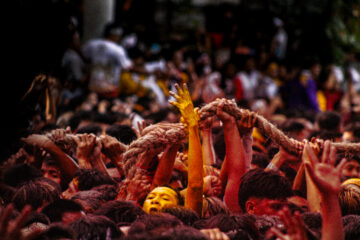
WRITERS MUST acknowledge the roles of linguistics and memory in writing and shaping the sounds and visuals of a poem, a Palanca award-winning poet said.
Poet Allan Justo Pastrana, who notably makes use of his fascination with language and etymology to match his imagery, showcased his second published book Field (2024) in the second episode of MaKathAklatan: An Author Lecture Series on Tuesday, Feb. 18.
Field tackles geography through linguistics and etymology and features poetry in both Filipino and English. A part of Pastrana’s new collection includes its subject traveling between languages to test the limits of the two. Some of the poems include Filipino and English versions but are not direct translations of one another.
“That’s why I combined Filipino and English poems in one collection, and unproblematically, I feel like I didn’t need to explain any of it. I just needed to write a book that combines both Filipino and English and all of these different parts would flip in and out of these two languages,” Pastrana said.
Born in Muntinlupa, the poet traced his geographical perception back to his home. Pastrana drew inspiration from places from his childhood to memorialize them in Field and considered the collection as a composite of places from his life.
For Pastrana, autobiographical works are important as it proposes a different perspective of the world. He specifically noted the feminist movement and post-colonial studies that brought private stories into the public despite these autobiographical works being considered as “insignificant documents.”
“I feel like we’ve always thought of autobiographical stuff in literature as completely solipsistic, but I feel like it depends on how you approach autobiography… I feel like autobiographical details that find their way into poetry would help a lot of people to sort of understand other people’s circumstances,” he added.
Pastrana, an alumnus of the UST Conservatory of music, also cited how his background in music helped during his early ventures in lyric poetry, emphasizing the importance of sound in it. He added that his diction and understanding of poetry was informed by music.
“Because I could think of rhythm, not just in concrete terms, but also in abstract terms. I feel like my understanding of, for example, of rhythm in music, for example, got translated to poetry immediately,” he said.
Pastrana bagged the third prize at the Don Carlos Palanca Memorial Award in 2007 for his essay The Lady’s Train, the grand prize at the Maningning Miclat Poetry Award in 2005 and the Thomasian Poet of the Year in 1998 and 1999.
“MaKathAklatan: An Author Lecture Series” is a program created by the UST MaKatha Circle, the official student organization of Creative Writing students, to showcase notable Filipino writers.
The second episode titled “Cutting Deep: The Personal Language of Poetry” was held at the Engineering Conference Hall. F – Nicole Samson



